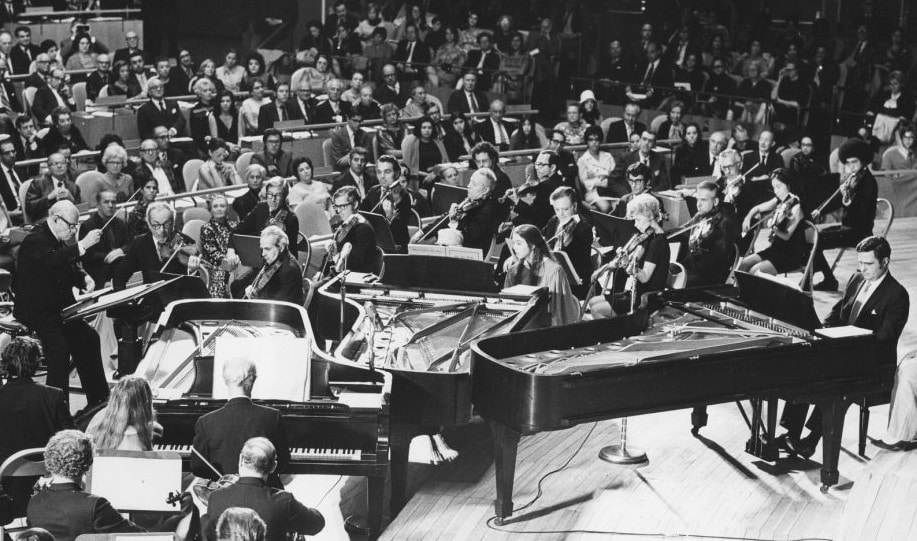Just in: Child composer tops US classical charts
mainThe week’s results are in from Nielsen Soundscan. They show that the top-selling classical album was a debut by Alma Deutscher, the eight year-old English child who is being traipsed around the chat shows as the next Mozart.

The next highest new entry is, heaven help us, this:

Looks like the classical recording business in the US has been boning up on Barnum & Bailey.





The mainstream “classical business” is a total joke and your comparison to Barnum & Bailey’s Circus is appropriate. We must attribute most of the blame for this deterioration upon the major labels, above all Universal Classics, once a serious leader in the field, who have degraded every aspect of the qualitative definition of great musical performance and great and true music making. In their pathetic search for turnover and big sales they have sold out to the lowest common denominator and debased any notion of consistent quality. Reading interviews with these people is always a depressing experience, as it is obvious that intelligence, knowledge and vision is not a prerequisite to being a senior manager there. In the end all of this “kiddy porn” and ersatz classical music will be forgotten and they will be left standing like the emperor without clothes. Alma Deutscher may be a phenomenon, but approaching the business predominantly from this angle leads to nothing but a Barnum & Bailey Circus, where so much of what is produced belongs in the freak show tent of the circus, including the executives behind this travesty.
Er, no. Record labels, like newspapers, reflect the views and wishes of the buying public, they don’t create them. They try to identify what the punters want, and then create it.
Universal Classics (not to mention Sony, EMI, Virgin, Warners) create plenty of first-rate core classical product (Netrebko, Kaufmann, Barenboim, Bartoli, Dudamel, Mutter, Kavakos, Pires, Trifonov and many many more). The fact the consumers choose not to buy it in their droves is hardly the fault of the record label.
Remember: the chart shows what people wanted to buy and listen to, not what the record labels wanted to sell them (that chart would be very different). There are plenty of releases record labels would love people to be buying, which they aren’t.
Er, no for you too. Nothing is so clear-cut in this field. In my opinion both things happen, since record labels discovered that most people will never apply the right amount of time and energy to really build a musical sensibility, and will settle for what is easier and may have more impact instantaneously. That kind of easier music sells for people who see music in a mostly superficial way, just like comfort food, that will taste awesome but in the long run won’t be that great for your health. Disposable. One of the reasons people adhere to fads is also to appear socially in their circle, and most products available comercially have publicity designed to make people buy them for that reason.
I have nothing against labels exploring that avenue for profit, but if done ad infinitum, it drags the culture to the state it is now, in which what people want reflects only what’s been fed them by the media, killing or diminishing considerably the chances of other kinds of musical manifestations reaching the kind of evidence necessary to sell as much. How are they ever going to pay attention to something they have never been taught to see as exciting or fashionable? So, there is a danger in saying that the media gives people what they want, because then you’re not considering how the things that the same media pushes around are shaping what people want. And that is done to the most common citizen, that one that won’t have the will or the time to dig deep on the internet, record shops or libraries to find different, unique things. There is a danger in not giving easier access to other kinds of music as is given to the most mainstream ones, since it’s going to be very difficult to familiarize them later to ears that are accustomed to more immediate kinds of music.
I say all this because I live in Brazil, and I experience here, mostly with the young people I teach, a completely irrational aversion to classical music. People are utterly impatient to even giving it a try, some of them say it makes them sleep or sounds like funeral music. And that’s not the most cerebral kind of classical music, even some very popular Mozart or Strauss waltz can cause this ridiculous attitude in them. Why? Lack of exposure, wrong associations, stupidity, the uses of classical music in media illustrating it as… um, classical, stuffy, old, as opposed to young, exciting, fashionable… or as I feel, true, sincere, beautiful, original, emotional… See, I had a different education, my mother and other people I love always listened and showed me all kinds of good music, and I started wanting these kinds of music too. That’s the problem in sacrificing quality for sales and only sales. People should have conditions to ask for better music, it’s not right to say that labels offer only what people want, if what they want comes from what they have been presented too. Or at least some people who are possibly more sensitive to music should have a bigger variety to choose from in a more accessible way, because as Frank Zappa used to say, “most people would never know what good music is, even if it came up and bit them in the ass”.
Oh, by the way, the 5 Browns in questions are not bad, I liked what they did to the music on the clip posted to the comments here anyway, but I think even they would be too much for most of the population, who would surely be asking by the one minute mark if no one was going to sing.
@Gustavo, you say
“most people will never apply the right amount of time and energy to really build a musical sensibility, and will settle for what is easier and may have more impact instantaneously.”
That’s exactly what I said – record labels reflect what the public want. If they don’t want what classical musicians think they ‘should’ want, that’s tough. If they want easy listening, instant impact, then that’s what record labels will serve up. There’s no moral obligation on any label to promote music that you, I, or anyone else thinks people ought to want to listen to! That said, most record labels do do so (particularly the biggest ones who are often criticised the most), and the more curious consumer is fortunate that these days a proliferation of smaller independent classical labels keenly support very core classical music and musicians.
Sorry ‘Anon’, I take exception with your simplistic argument that “record labels reflect what the public want”. Recording companies, through their signings and accompanying promotion set the benchmarks and parameters for what is called ‘classical music’, what is called ‘a great artist’, etc. Denying that they have that responsibility is misguided and dishonest. The recording companies, particularly the majors and particularly Universal, have intentionally aimed at the lowest common denominator and they have made a concerted effort to lower the musical standards and the criteria by which they sign an artist and which artist they promote heavily. To put all of the responsibility on the public is simplistic and naive. Brands create a culture and Universal Music, in particular, have abandoned their responsibility to push and actively promote quality above all. They have blurred the lines and try to sell a wolf in sheep’s clothing, believing that it will work. The sad thing is it doesn’t work and they will eventually fail completely. A major corporation, especially in a small market area, is a gate keeper and can create and lead trends and opinions. Some of the recordings that Universal, particularly Deutsche Grammophon, issue today are simply fake, artificially created and hyped rubbish that will have no lasting qualities. Among my circle of friends, not one would disagree with this observation, as we discuss it repeatedly whenever we meet. They too are fed up with the poor quality recordings that are pushed and hyped like crazy by Universal, only to discover half rate pianists, half rate new composers and half rate recording quality. You can only fool the masses and that’s why Universal has focussed on them and abandoned the core customer. The masses are fickle and couldn’t care less about brand loyalty, etc., so everything DG is doing is so totally short term and basically of sub standard quality.
With all due respect, I think “classical music” should be classical. This Nielsen classification is being used as a waste-basket by the industry.
I love it when children let their creativity run amuck and the possibilities seen through our eyes seem endless, but this kid, charming as she is, is being shamelessly marketed by her parents, and the mainstream media. So, when I see Ellen Degeneres, who is not a bad sort, or Diane Sawyer, who worked for Nixon as a young lass, but is now a darling of the neo-liberals, going ape shit over this kid, I just have to wonder. I heard some real prodigies years ago at Meadowmount, though their thinking was also impeded by the 19-century virtuosi pieces Galamian made them play with not very musical, or, at least, not very interesting bowings, fingerings and phrasings to develop the technique of a sort one might develop in a modern factory, and the stunted understanding and appreciation of music that went with it- and this kid seems to be just as challenged (though, who knows, maybe in a year the duckling in her could surprise us and turn into a swan). As for the playing and composition in the clips, oy vey and ‘tinkle, tinkle little star’. Branding can be a terrible thing…..and a terrible thing to waste.
Norman, in your inimitable way you have been very diplomatic. Sorry, but I just couldn’t resist.
Not a complete horror. What DO you do with five kids who play piano? Tell them to NOT play the piano?
http://youtu.be/l6B-WEB54P0
Fair question, but no, you give them a good academic and non-academic education- including a strong musical education- open up for them a new universe of possibilities, and encourage their creativity, but you don’t exploit them by marketing them shamelessly and holding up something ordinary they’ve done, even if it is not dreck, as something special. It is a formula for disaster, and could end up harming them later. It’s my parental opinion only, though one obviously not shared by the mothers on Generes’ show who were oohing and ahhing.
Well, they were home-schooled so there’s the “non-academic” education and they seem to have been to Julliard so that puts a check in the “academic” education box.
Now they are legal adults in their 20’s and 30’s… do they go get a job in fast food like most other music school graduates or… do they go out and do some concerts? There seems to be an audience for it?
It would be an easy choice for me.
All this group hand-wringing over what will likely be a fleeting success anyway… it’s classic.
All my eventual interest in this recording was lost, when I read this:
2-4. PIANO SONATA IN E-FLAT MAJOR
I – Moderato (played by Sam Haywood, piano)
II – Fantasia (played by Alma Deutscher, piano)
III – Rondo (played by Alma Deutscher, piano)
A piano sonata of which one mvt is played by one pianist and the other two by another one….. yeah, sure.
Not a horror at all. They are quite good. Anachronistic, maybe, and I don’t plan to acquire their album, but piano transcriptions of orchestral music goes back at least to Liszt. There is nothing crossover about this transcription of performance. The setting is certainly novel, but if this can get more people to listen to Stravinsky, bravissimi. To carp at this would be downright stuffy.
Please pardon–or correct my typos.
oh my god that 5 browns thing is dreadful!
all the melodramatic head movement and pretentious flying wrists!
it sure “sounds” awesome, except not one of them is playing anything particularly demanding. let’s hear a few of them solo some Liszt, or some actual piano repertoire.
On their new album, the 5 Browns play The Rite of Spring? You don’t think that’s demanding, with all its rhythmic changes, for five pianists to play?
It’s not proved overly demanding for two talented people to play on the same piano, or for certain organists to play on a single instrument alone. Why should something which is mostly in a three-part texture prove difficult for 5 people to play on pianos?
Just let us know when you are ready to present your own performance.
In defense of the Browns (though let it be noted I would never buy a “5 Browns” CD), they all did graduate from Juilliard so clearly have chops. Unfortunately, they were also blessed by a 60 Minutes profile a few years ago, and since one is always looking for a hook, the prospect of five piano-playing siblings proved too attractive to record executives.
But they’re not Richard Clayderman or David Helfgott.
I’d never heard of The 5 Browns until now, so read about them. (I wonder how the parents were able to afford sending all five to Juilliard at once, not to mention giving them all lessons and instruments, but I digress.) Apparently the father went to prison for sexually abusing all three daughters for a period of years. That fact in and of itself does not detract from whatever musicianship the five might have. But trotting your eight-year-old daughter around from venue to venue exhibiting her for cash at that early age might be its own form of child abuse. Oh for the days when a certain air of tawdriness didn’t adhere to classical-music marketing.
When exactly might those days have been, Donald? Mozart’s father hawked him round as a child ‘star’ too, so must be somewhere before an awful lot of classical music and musicians.
Quite so; Empress Maria Theresa herself referred to the Mozarts as “useless people, hawking themselves around like beggars”.
Hrumph! Sounds like this guy named Leopold who dragged his very sickly young child from court to court back in the 1760s. I’ve always contended that dad had a role in Wolfgang’s early demise because the poor kid spent so much of the “Grand Tour” sick in bed with a number of serious ailments, hence eventually weakening his immune system.
I’ve never heard Leopold accused of child abuse although he probably should be (in today’s terms). I know nothing of Ms. Deutscher other than what I’ve seen in limited video interviews. She seems like an extremely happy child. Are we to assume that the days of the child prodigy are long past us? Give the kid a break. If she’s the “real deal” her music will speak for itself. If not, she’ll flame out like so many others before her.
Reminds me of Vladimir Horowitz quote about three types of pianists . . .
Robcat, Thankfully, Norman didn’t post my misconceived reply to your comment, since my mind was still on the kid and I missed your point and hadn’t heard the Firebird. It’s a bit MTV, but the Browns have done a commendable job.
Rather than Mozart, Alma’s gift reminds me more of Schubert who had a peculiar harmonic sense that unlocked streams of melody. Her improvisations have an inner logic to them, sometimes seeming to stray away from the original permise but is tied up neatly at the end.
Schubert, Mozart and Alma were lucky to have parents to nurture their talents rather than constrict them in a four square box. I can only imagine with horror if she had to take Czerny and Hanon as models rather than Richard Strauss – what was that, at the age of 3?
I am curious when she learned harmony and counterpoint. Leopold corrected his son’s mistakes at least up to the age of 8 or 9. I was wondering about the series of descending diminished arpeggios in the opera or how she knew what the range of the voices should be.
So much of composition starts from doodling around the piano. Chopin from an early age must have been trying out all those interesting chromatic combinations that he used for the rest of his life.
@ CJ
Appreciate your perceptions and supplementary info.
Here’s some organ improvisations quite noteworthy:
http://youtu.be/_DP1JgeTraI
For me, her segments are invariably more interesting…not usually a fan of organ performances, I do enjoy what she does with it.
Just found this string quartet she composed as well as performed… remarkable like all she does.
http://youtu.be/uhGwpwr94X4